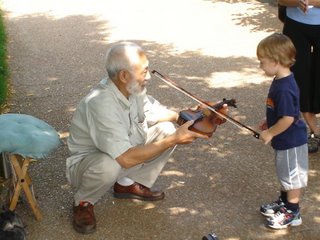| David Armano has written an excellent piece entitled “What I Learned in D-school” on Logic + Emotion. He has inspired me. This entry could easily be called “What I Learned While Reading What I Learned in D-school”; thanks, David. Pratt’s Mantra, "Be true to your work, and your work will be true to you." Why not apply Pratt’s Mantra to the classroom? Why not have kids believe in what their doing? Why not have teachers believe in what their doing? Why not create a space where teachers want to go to work and students want to learn? After all If we believe in our work, there is nothing we won’t do to see it through. The bottom line is the same for teachers and students: passion kicks ass.
Develop First Ideas We should never be satisfied with first ideas. They are first steps to something better. First ideas can sometimes be really good—but they need to be developed before they become something powerful, inspirational, and even wonderful. We need to stop believing that first ideas are sacred, and tinker away.
Too often we let students get away with undeveloped good ideas. They need to know that good ideas are the jumping off point. In the classroom it comes down to timely, collective feedback. All too often we reward the good idea to the detriment of the well developed good idea. It’s the difference between a 5-line portrait and a Rembrandt. Capture and Execute Ideas Ideas need to be written down and executed rapidly or they disappear forever. I carry a BIB (Big Idea Book) with me wherever I go to capture ideas, metaphors, observations, and conversations. We need to encourage our students to carry around BIBs too. Places where students can record ideas, play with language, transcribe metaphors, and build arguments. We need to go large and create Wiki sites in order to build larger collective BIBs where students can workshop and critique ideas. Finally, we need to provide the support system necessary for students to execute ideas—time, space, materials—before they go stale.
| 

Comments on "David Armano is Right."
post a comment